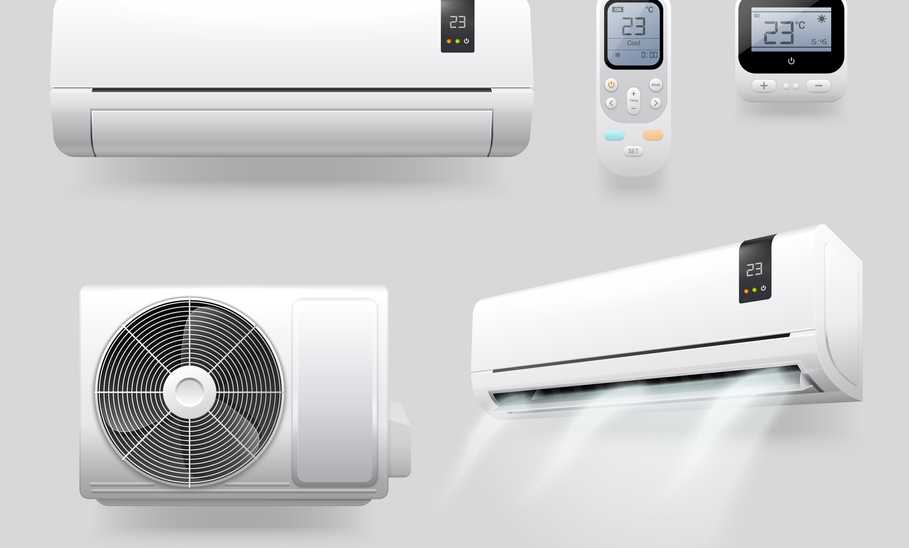- Cooling area: 550 square feet
- Cooling capacity: 12,000 BTU
- CEER: 20 SEER
- Dimensions: 31.18” W x 7.91” D x 11.5” H
- Type: Mini-split
- Price on publish: $649.96
Best Air Conditioners of 2024, From Mini-Splits to Central HVAC Units

Our evaluations and opinions are not influenced by our advertising relationships, but we may earn a commission from our partners’ links. This content is created by TIME Stamped, under TIME’s direction and produced in accordance with TIME’s editorial guidelines and overseen by TIME’s editorial staff. Learn more about it.
As most of us are aware, the Earth continues to get warmer; summers are longer and hotter and likely to become even warmer. In most areas, keeping indoor spaces cool and comfortable requires the use of air conditioning. As well as keeping us cool, air conditioning, when installed and used correctly also helps mitigate ambient household air pollution.
To help end this worldwide health epidemic caused by poor air quality and toxic indoor environments, Michael Rubino, a mold and air quality expert and environmental wellness advocate founded a company called HomeCleanse. I consulted him, as well as Traci Fournier, VP of Operations at One Hour Heating & Air Conditioning and Glenn Wiseman, RASDT, RHDT, at Top Hat Home Comfort Services about all things air conditioning to put together this guide for choosing the best window air conditioner, central HVAC unit, mini-split or portable model for a range of individual needs and spaces.
![[object Object] [object Object]](https://i5.walmartimages.com/seo/DELLA-12000-BTU-Wifi-Enabled-20-SEER-Cools-Up-550-Sq-Ft-110-120V-Energy-Efficient-Mini-Split-Air-Conditioner-Heater-Ductless-Inverter-System-1-Ton-He_02b79522-032f-49e5-b822-c6a5ab5e4d25.5cfc142a94c0537daf5991f2b1b92e60.jpeg?odnHeight=2000&odnWidth=2000&odnBg=FFFFFF)
Boasting an excellent set of smart functions including 4D air flow, 24-hour timer, sleep mode, multiple fan speeds, heat and cool settings, and a smart sensor that measures the air temperature at the remote (not right in front of the unit itself), this Della split AC offers excellent value for the money. At 41 dBA, it's also incredibly quiet so you don’t have to worry about raising the volume on your TV every time the compressor kicks in. If, however, you’re prone to using the excuse of not hearing your house mate or significant other over the din of the air conditioner, you may want to look for a noisier alternative.
Other features include intelligent defrost, filter cleaning reminders, and a turbo mode.
Quiet, full-featured, smart mini-split AC unit with intelligent defrost.
![[object Object] [object Object]](https://mobileimages.lowes.com/productimages/5e5db68d-9ce7-426c-962a-9bfb1796d856/63113469.jpg)
Not only does this Frigidaire AC feature Wi-Fi and smart home capabilities, it also includes a dehumidifier and a built-in air quality sensor so you can monitor your home’s air for allergens.
The U-shaped design installs over your window sill and the louvers feature an auto swing option for more efficient cooling. Smart features work with Alexa, Android, iOS, and Google Assistant and the Frigidaire app. And it's ENERGY STAR certified.
High capacity, Energy Star certified, U-shaped window air conditioner with built-in air quality sensor and smart home capabilities.
![[object Object] [object Object]](https://m.media-amazon.com/images/I/41wE5hQVVuL._SL500_.jpg)
Goodman—one of the central air conditioner brands Wiseman recommends—manufactures quality affordable units backed by a 10-year warranty (if installed by a qualified professional). They feature energy efficient compressors, a single speed split capacitor for consistent airflow, and filter-driers that help keep the entire system free of contaminants and moisture (two things you absolutely do not want setting up shop inside your AC unit).
The copper coil tubing (that comes with the unit) provides excellent heat transfer performance—meaning it efficiently sends hot air out of your house while circulating cool air into it (copper tubing holds heat inside of it well).
Affordable, dependable central HVAC unit from a reputable brand; requires professional installation for warranty.
![[object Object] [object Object]](https://www.bougerv.com/cdn/shop/files/BougeRV2899BTUPortableAirConditioner_720x.png?v=1694172961)
For all your glamping, boating and RV adventures, this truly portable (you can carry by the handle) mini-AC unit from BougeRV cools about 50 square feet of space in a minimal time period—and keeps it cool while you sleep. It’s also great as an emergency air conditioner during electrical outages (as long as you have a small room you can set it up in).
Includes a DC power cord, AC adaptor, venting hose, and drainage pipe. While you can connect it to a portable power station, do not use your car battery or a power inverter.
Portable mini-AC unit for tents, RVs, boats, and emergency use for cooling between 43 and 54 square feet.
![[object Object] [object Object]](https://i5.walmartimages.com/seo/MRCOOL-DIY-24000-BTU-Ductless-Mini-Split-Air-Conditioner-Heat-Pump-Energy-Star-230v-with-FREE-Line-Set-Cover_3cd3a692-8a02-4674-aa1f-3c91eee0cdaa.72a44c4f9d4a520c10750e58b10e2dec.jpeg?odnHeight=2000&odnWidth=2000&odnBg=FFFFFF)
This ductless, mini-split unit from MRCOOL features quick connect lines, Google Assistant and Alexa compatibility, and a free line set cover. The 25-foot line set comes ready with eco-friendly R-410A refrigerant and the quick connectors mean that you can install the entire system without any special tools or professional assistance—a DIYer’s dream.
The unit includes a heat setting as well as cooling and dehumidifying controls. The MRCOOL DIY app makes operating easy and intuitive, and a 7-year warranty covers the compressor. (There’s a 5-year one for all other parts.)
Mini-split ductless AC system with heating designed for DIY installation.
![[object Object] [object Object]](https://i5.walmartimages.com/seo/Haier-Serenity-Series-6-000-BTU-Window-Room-Cooler-Air-Conditioner-AC-Unit_7e9490d9-c5d6-4edb-970c-60afca589def.f08e61b21eee39e3d30b131267503ade.jpeg?odnHeight=640&odnWidth=640&odnBg=FFFFFF)
This unit works best in small rooms like a bedroom or home office. It features an electronic thermostat with digital display, remote control, and an easy-to-clean slide out filter. Includes an EZ mount window kit for quick, pain-free installation. There’s also a dehumidifier mode, built-in timer, and 4-way air direction for optimal comfort and efficiency. One of the best things about it though, is the internal compressor blanket which effectively dampens sound and vibration.
Small air conditioner with quiet operation and easy installation, plus a dark mode for optimal sleeping.
This ensures we retained and reorganized all the content without any additions.
![[object Object] [object Object]](https://images.thdstatic.com/productImages/a56123f7-460c-43f2-ba23-750f504c3a64/svn/white-bosch-mini-split-systems-8733954438-64_600.jpg)
The indoor air handler component of this Bosch mini-split system features a modern, sleek design that doesn’t loudly announce its presence to anyone within earshot, “Look at me! I’m an air conditioner!” (And the outdoor condenser lends itself to easy concealment).
It features a wide temperature range of -22° to 122° Fahrenheit as well as an auto heating mode that prevents unoccupied homes from getting frozen out in severe weather (making it a great option for your remote cabin in the woods). Comes with a wireless remote and 15-feet line set with refrigerant. Requires professional installation.
Mini-split system from Bosch featuring a wide temperature range, auto-heat setting, and 10-year residential warranty (requires professional installation).
![[object Object] [object Object]](https://www.pioneerminisplit.com/cdn/shop/products/main-9-12_1800x1800_9488706b-e615-48b9-b7c7-4f89ad396363.jpg?v=1669067716&width=1080)
Operating at 23 to 37 dBA, this Pioneer mini-split unit is one of the quietest available. The temperature range extends from -13° to 122° F with four modes of operation including heat, cool, dehumidify and ventilate. Includes a 16-foot copper line set pre-charged with refrigerant, washable air filter, communication cable, and 10-foot drain hose. Notably, a wireless Wi-Fi enabled remote is sold separately.
Budget friendly, very quiet mini-split AC unit with heat function (wireless remote sold separately).
![[object Object] [object Object]](https://images.thdstatic.com/productImages/c6ff22bd-2aa8-45a6-b7f7-e7b6bc9bd81b/svn/midea-window-air-conditioners-maw12v1qwt-64_600.jpg)
The U-shaped design of this Midea air conditioner means it installs over your window ledge, allowing normal operation of your window on days that don’t warrant an AC—or whenever you need to let some fresh air inside (you know, when you accidentally burn something in the oven).
Both app and voice control options make controlling the Midea easy and the long-distance air flow reaches 20 feet. And, it received a 2024 energy efficient certification from ENERGY STAR.
Incredibly quiet, smart AC unit with U-shaped installation and Energy Star most efficient rating.
Get it here: Midea U-Shaped 12,000 BTU Air Conditioner
The U-shaped design of this Midea air conditioner means it installs over your window ledge, allowing normal operation of your window on days that don’t warrant an AC—or whenever you need to let some fresh air inside (you know, when you accidentally burn something in the oven).
Both app and voice control options make controlling the Midea easy and the long-distance air flow reaches 20 feet. And, it received a 2024 energy efficient certification from ENERGY STAR.
Incredibly quiet, smart AC unit with U-shaped installation and Energy Star most efficient rating.
Get it here: Midea U-Shaped 12,000 BTU Air Conditioner
![[object Object] [object Object]](https://images.thdstatic.com/productImages/ee6d551a-6cf7-402e-b4d2-bd90ace14282/svn/whynter-portable-air-conditioners-arc-1230wn-64_600.jpg)
This portable unit from Whynter features a hose-in-hose setup which ensures minimal heat leakage and quicker cooling with independent cool air circulation. The inverter technology boasts a variable speed system which helps to minimize power consumption.
Wi-Fi and voice enabled, it works with Google and Alexa—or you can control it via the NetHome Plus app. Comes with a window installation kit (for the duct), washable air filter, and wheels for easy moving and transporting.
Portable, quiet AC unit and dehumidifier with hose-in-hose construction (intake and outtake together).
![[object Object] [object Object]](https://m.media-amazon.com/images/I/31eqDkTxh4L._SL500_.jpg)
Always a fan of appliances that are not white or cream, I love that this portable AC from Midea comes in black. It features the efficient dual hose design and variable speed inverter technology similar to that of the Whynter while also functioning as a heater. With dBA ratings of 41.8 on low and 49.3 on high, it’s one of the quieter portable AC units available.
It also has a dehumidifier mode that collects a significant amount of water from ambient air. This means if you live somewhere with high humidity, you’ll need to empty the condensation tank often—or its contents will end up snaking their way across your living room floor.
Portable, smart AC with heat function, excellent dehumidifying capabilities, hose-in-hose construction, and variable speed inverter technology.
“When units are oversized or undersized, they can lead to severe complications such as high humidity, temperature swings that create condensation, and poor airflow,” said Rubino. For central systems, this can even compromise the pressure of the building, creating a negative interior pressure that pulls in moisture from the outdoors, he explained.
HVAC technicians use something called the Manual J calculation to help them decide the best-sized air conditioner for a specific space. “The key to this calculation is working with accurate information,” said Fournier.
For a central system, they take precise measurements throughout the home, often conducting tests to assess the efficiency of insulation and the quality of door and window seals, she explained.
When choosing a window AC or portable unit, pick one with a BTU measurement for the size of the room you intend to install it in. The general calculation for that is square footage multiplied by 20 BTUs which will give you a measurement in the 1000s. For instance, if your room is 300 square feet, multiply by 20 for 6,000. This means you should look for a 6,000 BTU air conditioner.
“Air quality is an important feature for AC systems. This can include ultraviolet light treatment to kill bacteria in the air as well as air filters,” said Mark Collins, CEO at 1-800-Plumber + Air.
“For central AC units a programmable thermostat helps your system adjust to the environment and maintain temperature consistency,” said Wiseman. He suggests changing the temperature by a few degrees while you are at work or sleeping, which contributes to overall savings.
Air conditioners that feature a dehumidify setting are useful if you live in a region with consistently high outdoor humidity.
Consider smart connectivity so you can control the temperature of your home remotely from your smart device no matter where you are.
How much direct sunlight your home receives as well as the number of doors and windows influence the efficiency of your air conditioning unit. A ceiling fan (or two) will also help circulate the air in your home, making it feel cooler.
Air conditioners receive an energy efficiency identifier measured in a SEER (Seasonal Energy Efficiency Ratio). The higher the number, the more efficient it is. Look for units that have an ENERGY STAR award as well as a high SEER number.
Window air conditioner units offer easy installation that most homeowners can accomplish on their own. They’re also often the best option for renters, apartments, or co-op buildings that have a plethora of restrictions and rules to follow when it comes to renovations.
Portable air conditioner units are even easier to install (you just need to vent the hose out of a window) and can be shuffled from one room to another when needed. Wiseman recommends purchasing an extra vent kit if you go with a portable model.
“That way, you can move the unit to multiple rooms and focus on setting up the hose(s) and not messing around with the vent. This will make your life a lot easier,” he explained. I, for one, am always for anything that will make life a bit easier, especially when it comes to air conditioning.
For rooms without windows or in homes that do not have duct space between floors (making a central unit installation challenging), mini-split systems offer an economical and helpful choice, said Wiseman. Many hotels use mini-split units in their rooms. In most instances, you should enlist an HVAC technician to install one of these.
As well as being more energy efficient in the long run, a central air conditioning system provides more air filtration, Rubino told me. “For example, a mini-split does not allow you to upgrade to a higher MERV-rated filter, leaving you stuck with the standard filter that comes with the unit,” he explained, “This means you must be more diligent about cleaning the unit regularly (quarterly instead of semi-annually) because particles like mold and bacteria are too small to be filtered out entirely which allows microbial growth over time.
Which kind is best for you depends a lot on the nature of your home. If you have the budget and own your home, a central air conditioning unit can be a great investment and lower your energy bills for years to come.
“Making a significant purchase for any home appliance should be heavily researched,” said Rubino. (Which is why I’m writing this guide!) When comparing manufacturers and air conditioner brands, consider how easy it is to maintain and find replacement parts as well as the length and scope of the warranty. Read reviews for that specific unit from the manufacturer.
To select these air conditioners I researched companies, scoured online reviews, and conducted consultations with professional experts in the HVAC industry. I took into consideration reliability, available features, cost, and warranty information to compile this guide of the best options for a variety of situations (and budgets).
Generally, take the total square footage of the space you intend to air condition and multiply that by 20. This will give you a BTU measurement in the 1000s.
For central units, professional technicians use something called the Manual J calculation, Fournier told me. This includes the square footage of the home or facility, its geographical location and directional orientation, an evaluation and rating of the insulation, the number of windows and doors plus their energy efficiency and directional orientation and the number of occupants.
The detailed calculation breaks down like this:
“By adding the total number of BTUs from all of these equations, your technician will have the total AC unit load required for your home,” explained Fournier.
“While a central air conditioning unit is initially more expensive than window or portable units—because of the high installation costs—it pays for itself over time by saving you on energy costs,” said Wiseman.
Central AC units are also more efficient than window ones because they cool the entire house instead of just one room at a time, explained Wiseman. They use less electricity because they don't need to run as often when the weather gets warm outside.
“Some central air conditioners come with a variable-capacity operation that allows them to adjust their output based on how much cooling your house needs during different times of the year. If you do routine maintenance on them, they can be very inexpensive to keep up over a long period of time,” said Wiseman.
Usually, mini-split systems are more economical and can be helpful replacements for rooms that do not have windows, said Wiseman. Designed to mount high on the wall, a mini-split system helps circulate air evenly throughout the room. These are the kind of systems you find in many hotel rooms.
“They need to be installed on an outdoor wall in order to connect the refrigerant and condensate drain lines of the unit to an outdoor compressor and condenser,” said Wiseman. Most people enlist the help of an HVAC technician to ensure proper installation.
Window units, on the other hand, are self-contained and can be installed by homeowners. They’re a great solution for many homes, though ultimately a split system will likely be more energy efficient. If you rent or own an apartment in a prewar co-op building with all kinds of rules and restrictions (like me) a window air conditioning unit is probably your best solution.
“Start with simple steps like sealing any drafty areas and making sure your insulation is up to par,” said Fournier. And, when it’s time to upgrade, purchase models that are ENERGY STAR certified to meet strict efficiency standards.
Other tips from Fournier include: use energy-efficient light bulbs like compact fluorescents or LEDs and upgrade your windows to double or even triple-pane models to keep the heat in and the cold out.
Rubino suggests having a service provider well-versed in environmental contaminants perform regular maintenance. To find a technician that fits that bill, look for those with NADCA certification.
If you have a centralized system, clean it twice yearly (usually in spring and fall). If you have a PTAC system, window AC units, or mini splits, clean it at least once every quarter.
“Since microbial growth can happen inside the evaporator coil, the blower wheel, and the ductwork, it's important that the cleaning is thorough!” he said.
To be adequately efficient, central AC units require ductwork throughout the entire home.
“If you have the ductwork already on the main floor, your options would be to renovate to have it installed through the remainder of the home, or supplement on the upper floors with either window units or a ductless system,” said Wiseman.
Ductless, or mini split systems will be most effective for rooms with outdoor-facing walls that do not have windows, he said. They’re much less expensive than installing the necessary ductwork throughout the entire home.
Another option is to use the existing ductwork for a high-velocity AC system, said Wiseman. More powerful than traditional HVAC systems, these “run air through flexible tubes that are much smaller than traditional ductwork, which can retrofit into your home's structures with minimal construction.”
These high-velocity systems push air at much higher rates making them more energy efficient as the system does not need to stay on for long to achieve the desired level of coolness (something I think we all strive for, at least some of the time).
The information presented here is created by TIME Stamped and overseen by TIME editorial staff. To learn more, see our About Us page.



